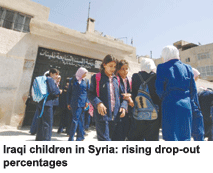 Iraqi refugee children in Syria are struggling to keep up at school, or are dropping out to seek paid work, according to the UN Children’s Fund (Unicef). “Education is absolutely central to the future of all children. Having a generation not equipped to participate in the economy of their country serves no one,” says Sherazade Boualia, head of Unicef in Syria.
Iraqi refugee children in Syria are struggling to keep up at school, or are dropping out to seek paid work, according to the UN Children’s Fund (Unicef). “Education is absolutely central to the future of all children. Having a generation not equipped to participate in the economy of their country serves no one,” says Sherazade Boualia, head of Unicef in Syria.
Syria, which took in up to 1.2 million of the two million refugees who fled sectarian violence in the wake of the 2003 war in Iraq, opened its public education system to the refugees, but many are unable to benefit. Children are often obliged to work to bring in extra income for their families. Iraqis are not legally allowed to work in Syria and black market jobs often pay just 100 SYP (US $2) per day.
For instance Hussein Ali (16) helps to support his family by cleaning a hotel. “We are very grateful for the cash assistance from the UN Refugee Agency,” says Ali, his father, who has a disability which prevents him from working. “But it isn’t enough.”
The plight of Iraqi refugees in Syria is getting worse as remittances are drying up and savings are running out. Over the past three years the number of Iraqi refugee children dropping out of school has risen steadily. Government figures indicate that 49,132 Iraqi refugees were enroled in the 2007-2008 school year, but the number dropped to 32,425 in 2008-2009. According to US-based NGO Refugees International, it dropped further this year with 30 percent fewer children enroled.
In coordination with the Syrian government, Unicef is attempting to tackle the problem with a US $6 million (Rs.28 crore) project, which includes improving facilities in schools with a high proportion of refugees, remedial classes for children who have fallen behind, and vocational evening classes for working children.
Refugee registration data shows most Iraqi refugee adults living in Syria are educated and value education for their children. But experts say solutions must be found or children will continue to drop out of school. “The needs of the whole family must be met to ensure children attend school,” says Elizabeth Campbell, a senior official of Refugee International.
(Excerpted and adapted from www.irinnews.org)